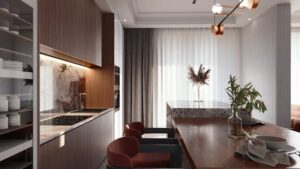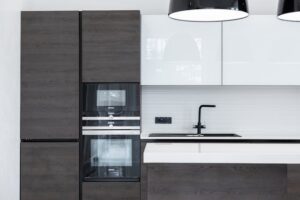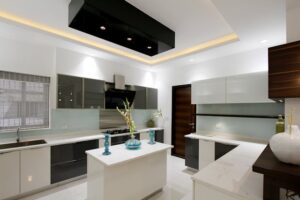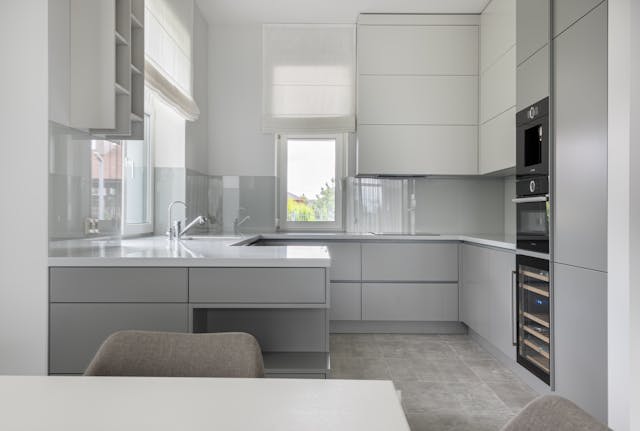Split-level Home, Kitchen Renovations
Although they were common between the 1960s and ’80s, Split-level House Kitchen Renovations are decidedly late-20th-century. With their multi-level structure that divides kitchen spaces from living and dining areas (and often slants part of the home underground), it’s almost impossible to discern architectural features inherent within an early century split style house plan. This design style is quirky and full of character, but it can result in challenges when renovating the kitchen. Need specific tips designed to get you thinking about what trendy materials and features can bring together the functionality of your split-level-kitchen renovation as well the wow factor?
How Interlocking Split-Level House Plans Function
What is a Split-level House Kitchen Renovations? These are multiple floor houses, usually about three floors high with a few steps between every level. In these types of homes, living areas ( kitchen, dining room and lounge) are generally on different levels. The era of the split-level house survived into the 1950’s and 1960s, still to this day a common choice for many homeowners who want to take full advantage of limited space on increasingly narrow lots.
Kitchen Renovations in Split-Level Homes

Size: Split-levels often have small kitchens.
- Light Amount: Kitchens Split-level House Kitchen Renovations tend to have less natural light, especially on a lower level.
- Flow & Layout: Where you live feel also plays into the flow and layout (exactly how rooms are separated may affect from moving through space to interacting between spaces). It can be difficult to balance functionality and style within these quirky layouts, but you just have to think ahead.
Split-Level Kitchen Remodel Ideas
Open-Concept Kitchen Design
- Opener: One of the best methods to provide a Split-level House Kitchen Renovations with modern charm is definitely opening it up and joining adjacent rooms, like dining or living room.
Benefits:
- Enhanced Flow: Linking open spaces together offers improved flow between the kitchen, as well as surrounding rooms to provide a more seamless way for family members to interact.
- Better Perception of Space: Your kitchen surely feels bigger and less crowded in an open-concept format.
- How to Get It: Ask a contractor if non-structural walls can be removed. Including a kitchen island is one other good method to create definition in the area with no walls.
PRO TIP: Opt for light-colored materials
Add More Natural Lighting
- Solution: Split-level homes can lack in windows in specific areas and so increasing natural light is important for giving the kitchen a brighter feel.
Ideas for Enhancing Light:
- Install Larger Windows: If the kitchen looks out on an exterior wall, consider enlarging or adding windows.
- Skylights are a perfect way to let in more pure light into darker regions.
- Paint Colors: Each color reacts to light slightly, so use a paler color as it will better show the natural daylight as opposed to brighter colors.
Quick Tips:
Bright surfaces pick up the light and turn it around a confined space, making it appear more open.
- Enhance Functional Spaces with Under-Cabinet Lighting
- Fill Vertical Space To Optimize For Storage
- Overview: If you’re working with a small square footage, it’s essential to make use of every inch.
Vertical Storage Solutions:
- Small New York City kitchen: floor-to-ceiling cabinets on one wall
BYO Towel Storage Utilize open shelving to keep everything within reach without the weight of overhead cabinetry.
Benefits:
Conserves counter space, to prevent cluttering the kitchen with more items.
Gives a contemporary feel while enhancing storage.
Two-Tone Cabinets for Depth
Explanation: The kitchen Split-level House Kitchen Renovations can be made more interesting by a touch of depth and visual appeal, two-versus-one-tone cabinetry is the new trend.
Common Combinations:
- Dark lower cabinets light upper cabs
- Forest green/navy accent features with neutral upper cabinets.
- Why It Works: The trend helps to create a focal point in the small kitchen, minimizing that boxed-in feeling.
Materials to use for split-level kitchen

Countertop Choices
- Common Materials: Quartz, granite and butcher block work well here.
- Lighter materials reflect light; Light reflecting help the kitchen have brighter.
Pros and Cons:
- Quartz (non-absorbent, stain-resistant and requires limited maintenance)
- Granite: Sturdy and heat-efficient though it should be resealed routinely.
- Butcher Block :warm and natural, this comes with a rich character but also constant maintenance.
Cabinet Materials and Finishes
Plywood or solid wood for durability and longevity.
- Glossy: Perfect for adding much needed shimmer and the illusion of space to your kitchen, glossy finishes usually reflect light better compared to other types.Matte: Matte finish do not shine mostly leaving a matted or flat look offer that contemporary touch.
- Green Options: For a more green option, think bamboo or reclaimed wood for the cabinets.
Flooring Options
- Sustain choices: If you desire a sustain, hardwood tile and luxury vinyl are all suitable selections here as well depending on the budget and point of device.
Pros and Cons:
Hardwood Classic look, but easy to damage with water.
Water-Resistant and Easy to Clean
- Luxury Vinyl: Can look like wood, tile or other materials while standing up better to cleanings and wear.
- TIP: Select light-colored flooring to help the kitchen feel more expansive and open.
Split Level Kitchen Layout Options
Galley Kitchen Layout
Ideally suited for many split-levels, the galley layout functions best in rooms that are long and skinny or separated by a staircase.
Advantages:
- Another great spotlight of this farmhouse kitchen is that it’s super easy to create in.
- Suitable for smaller spaces where open-concepts won´t work
Layout Tips:
- Use open shelving over the upper cabinets to avoid a crowded feel.
- For work for the tools, install your sinks and stoves on across walls.
L-shaped with Island.
- Ideal for: Kitchens opening onto the dining area
- Why It Works: The L-shaped layout is great for making optimum use of corner space to create a more open feel.
- Island choices include: a movable island with storage below for more prep area.
U-Shaped Layout
Brief: U-Shape layouts give you more storage and counter space which makes them perfectly suited for those who like to cook.
Tips for Small Kitchens:
Do not close all the sides off to avoid a confined feeling.
This leaves one end open or use glass-front cabinets to help create an illusion of more space.
Sustainable Kitchen Renovation ideas

Energy-Efficient Appliances
Why Spend In: Quality ENERGY STAR appliances help lower energy bills and reduce environmental impact.
Popular Choices:
An induction cooktop and an energy-efficient refrigerator further optimize for reduced carbon footprint.
LEDs the best long-life, energy-efficient lighting whoke-shabang around lol
Eco-Friendly Materials
Cabinets bamboo, reclaimed wood or sustainable harvested real-wood
Countertops:
For an eco-friendly option, look for countertops made from recycled glass (check out Terrazzo), paper, or concrete.Low emission paints Improve indoor air quality as some organic compounds are best avoided.
Sustainable Flooring Options
Kind: Flooring made from bamboo, cork and linoleum all extra type of long lasting in addition to environmentally friendly.
Pros:
- Why it is a Reliable and Green Source of Building Materials
- Eco Cork Fooring, so comfortable!
Common Questions (FAQs)
- Q: What is the most-functional kitchen shape?
A: Galley, L-shape are best because compact and everything close in. You may also want to make your kitchen more functional by adding an island or incorporate additional storage without crowding the area.
- Q: Are there any interior design tips for making a room feel lager?
A:Light-colored paint, lots of light from windows as well as artificial lighting and open shelving.contribuer. Using a lighter countertop and floor color are another way to maximize the space, visually speaking.
- Q: Two tone cabinets in style?
A: Yes, two-tone cabinets are still in high demand because they create a focal point and visual layer to the kitchen — especially when it’s used in an enclosed space or any of these smaller kitchens that we see with split levels.
Conclusion
Designing your dream kitchen in a split-level home can be more challenging due to the unique layout and space restriction. Functional design, natural light and sustainable materials are 3 key components to make a beautiful yet efficient kitchen. These tips will help you create that ideal kitchen, no matter what style or function minimalism with modernity traditional a mix of the two. If you want to know more about us then click here.
Difference table of the Content
| Feature/Aspect | Challenges | Solutions/Ideas | Benefits |
|---|---|---|---|
| Size of Kitchen | Often smaller kitchens | Use vertical storage solutions | Maximizes space utilization |
| Natural Light | Limited natural light | Add larger windows and skylights | Brighter and more inviting space |
| Flow & Layout | Separated areas affect interaction | Open-concept design | Enhanced flow and interaction |
| Cabinet Color | Can feel boxed in | Two-tone cabinets | Creates focal points and depth |
| Countertop Materials | Maintenance concerns | Use quartz or granite | Durable and low-maintenance |
| Flooring Options | Damage from water | Opt for luxury vinyl | Easy to clean and water-resistant |
| Kitchen Layout | Confined spaces | Galley, L-shaped, or U-shaped layouts | Maximizes efficiency and storage |
| Sustainable Features | Higher initial costs | Invest in energy-efficient appliances | Long-term savings and eco-friendly |
| Lighting | Dark areas | Under-cabinet lighting | Improves functionality and aesthetics |
